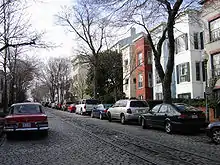P街
P街是华盛顿特区内四个不同的街道。这条街道是乔治·华盛顿总统于1791年命名的,这是一般街道命名程序的一部分,其中东西向行驶的街道按字母顺序命名,南北向行驶的按数字顺序命名。 [1]

西北区
西北区P街从北国会街一直延伸到乔治城大学的东部边界(西北区37街),另外还有一个大块的路段,从格洛弗-阿奇博尔德公园的西端一直延伸到西北区福克斯霍尔路。 P街穿过P街大桥穿过岩溪以及岩溪及波托马克公园道。西北区的P街也穿过杜邦圆环和洛根圆环。这条P街是四个街道中最古老的一条:1795年7月进行的调查显示,哥伦比亚特区的北部边界将岩溪的P街浅滩列为该城市原始北部边界的起点。 [2]P街第一座桥梁是造纸厂大桥。 [3]

西北区P街在商业和地形上都很重要。P街浅滩标志着远洋船只可以沿着岩溪行驶的最远点。 [4] Slash Run是岩溪的主要支流,始于P街1700号。 [5] 西北区P街也是该市最早的自由非洲裔美国人居住的地方。莱斯·黑尔(Lethe Hill)是最早在该市购买房地产的黑人之一,他于1819年在P街和30街购买了很多房产。另一位自由黑人威廉·贝克拉夫(William Becraft)在一个街区以外的地方买了一套房子。 [6]随着时间的流逝,在由西北区P街,宪法大道,16街和6街围成的10个街区中,形成了一个大片的自由黑人社区。 [7]在1890年代,里格斯市场(Riggs Market)是该市重要的市场之一,位于西北区14街至15街之间的P街西北。 [8]西北区P街508号的一座教堂,以前是锡安福音路德教堂,于1941年成为斯普林菲尔德浸信教堂。福音歌手埃德娜·加尔蒙·库克(Edna Gallmon Cooke)在那里开始了她的歌唱事业。 [9]
1885年,约翰·洛根少将( John A. Logan)购买了艾奥瓦环岛和西北区P街上的“斯通大厦”。三届总统候选人威廉·布赖恩(William J.Bryan)后来从洛根(Logans)租借了这座建筑。 [10]国会在1930年12月以洛根(Logan)的名字将环岛的名称更改为“洛根圆环”。 [11]杜邦圆环市民协会(Dupont Circle Citizens Association)成立于1922年,位于P街1767号的一栋联排别墅中。 [12]
东北区
P街在东北区从北国会大厦街到佛罗里达大道,横跨一个街区。该地区的东面是美铁铁轨,联合市场,高立德大学,奥利弗山公墓,美国国家植物园, 安那考斯迪亚公园和安那考斯迪亚河。

参考資料
- Hagner, Alexander. "Street Nomenclature of Washington City." Records of the Columbia Historical Society. 7 (1904), pp. 237-261, 240.
- Hagner, Alexander. "Street Nomenclature of Washington City." Records of the Columbia Historical Society. 7 (1904), pp. 237-261, 257.
- Hawkins, Don Alexander. "The Landscape of the Federal City: A 1792 Walking Tour." Washington History. 3:1 (Spring/Summer 1991), p. 10-33, 16.
- Hawkins, Don Alexander. "The Landscape of the Federal City: A 1792 Walking Tour." Washington History. 3:1 (Spring/Summer 1991), p. 10-33, 17.
- The "run", or creek, got its name from "slashes", or stands, or silver maples which stood near its headwaters. See: Hawkins, Don Alexander. "The Landscape of the Federal City: A 1792 Walking Tour." Washington History. 3:1 (Spring/Summer 1991), p. 10-33, 21.
- Brown, Letitia. "Residence Patterns of Negroes in the District of Columbia, 1800-1860." Records of the Columbia Historical Society. 69/70 (1969/1970), pp. 66-79, 74.
- Half of all property in this area was owned by African Americans. See: Brown, Letitia. "Residence Patterns of Negroes in the District of Columbia, 1800-1860." Records of the Columbia Historical Society. 69/70 (1969/1970), pp. 66-79, 76.
- McArdle, Walter F. "The Development of the Business Sector in Washington, D. C., 1800-1973." Records of the Columbia Historical Society. 49 (1973/1974), p. 556-594, 567.
- Springfield Baptist Church, Our History (页面存档备份,存于), accessed 30 October 2020
- Emery, Fred A. "Mount Pleasant and Meridian Hill." Records of the Columbia Historical Society. 33/34 (1932), p. 187-223, 202.
- Proctor, John Claggett. "Chronicler's Report for 1930." Records of the Columbia Historical Society. 33/34 (1932), p. 352-356, 356.
- Dupont Circle Citizens Association. No date. (页面存档备份,存于) Accessed 2012-10-20.